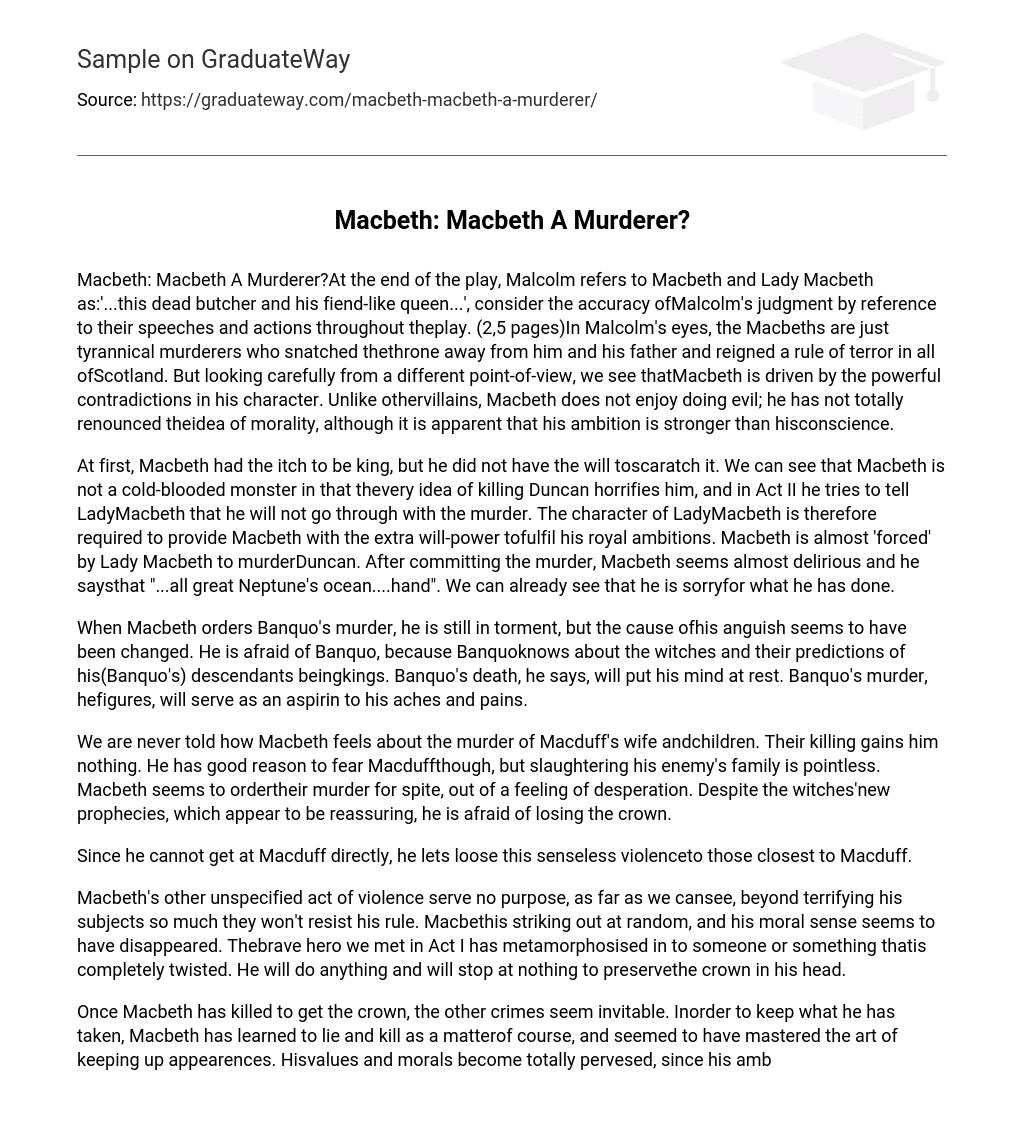Macbeth: Macbeth A Murderer?At the end of the play, Malcolm refers to Macbeth and Lady Macbeth as:’…this dead butcher and his fiend-like queen…’, consider the accuracy ofMalcolm’s judgment by reference to their speeches and actions throughout theplay. (2,5 pages)In Malcolm’s eyes, the Macbeths are just tyrannical murderers who snatched thethrone away from him and his father and reigned a rule of terror in all ofScotland. But looking carefully from a different point-of-view, we see thatMacbeth is driven by the powerful contradictions in his character. Unlike othervillains, Macbeth does not enjoy doing evil; he has not totally renounced theidea of morality, although it is apparent that his ambition is stronger than hisconscience.
At first, Macbeth had the itch to be king, but he did not have the will toscaratch it. We can see that Macbeth is not a cold-blooded monster in that thevery idea of killing Duncan horrifies him, and in Act II he tries to tell LadyMacbeth that he will not go through with the murder. The character of LadyMacbeth is therefore required to provide Macbeth with the extra will-power tofulfil his royal ambitions. Macbeth is almost ‘forced’ by Lady Macbeth to murderDuncan. After committing the murder, Macbeth seems almost delirious and he saysthat “…all great Neptune’s ocean….hand”. We can already see that he is sorryfor what he has done.
When Macbeth orders Banquo’s murder, he is still in torment, but the cause ofhis anguish seems to have been changed. He is afraid of Banquo, because Banquoknows about the witches and their predictions of his(Banquo’s) descendants beingkings. Banquo’s death, he says, will put his mind at rest. Banquo’s murder, hefigures, will serve as an aspirin to his aches and pains.
We are never told how Macbeth feels about the murder of Macduff’s wife andchildren. Their killing gains him nothing. He has good reason to fear Macduffthough, but slaughtering his enemy’s family is pointless. Macbeth seems to ordertheir murder for spite, out of a feeling of desperation. Despite the witches’new prophecies, which appear to be reassuring, he is afraid of losing the crown.
Since he cannot get at Macduff directly, he lets loose this senseless violenceto those closest to Macduff.
Macbeth’s other unspecified act of violence serve no purpose, as far as we cansee, beyond terrifying his subjects so much they won’t resist his rule. Macbethis striking out at random, and his moral sense seems to have disappeared. Thebrave hero we met in Act I has metamorphosised in to someone or something thatis completely twisted. He will do anything and will stop at nothing to preservethe crown in his head.
Once Macbeth has killed to get the crown, the other crimes seem invitable. Inorder to keep what he has taken, Macbeth has learned to lie and kill as a matterof course, and seemed to have mastered the art of keeping up appearences. Hisvalues and morals become totally pervesed, since his ambitions and thepreservation of it is on top of his priorities.
We can see how much these crimes have cost Macbeth. His reaction to LadyMacbeth’s death is a sign of complete despair-all feeling is dead in him. Hisfamous speech upon hearing of her suicide-“Tomorrow,……..”(Act V Scene Vlines 17-28)-is less an expression of grief than it is about the uttermeaninglessness in life.
Another aspect of Macbeth is his active and vivid imagination. ConsideringDuncan’s murder, he can vivdly picture all the consequences. His imaginationpursues him throughout the play, continually reliving his crimes and fantasizingabout present and future possible dangers. Nothing Lady Macbeth says willcomfort his mind and bring peace to him even for a minute. At time he seemscrazy or haunted.
In retrospect, we see that Macbeth is primarily the victim of his own ambition,supported by his active imaginations. The witches provide him with the idea ofbeing king, Lady Macbeth helps him overcome his natural hesitation to commitmurder, but Macbeth himself chooses between honor and the crown, betweensalvation in the next world and material gain in this one. Figuratively speaking,he chose to rule in Hell rather than serve in Heaven. Lady Macbeth, the ironlady ended up to have some rust in her. Her consience caught up to her tormentedmind and had tortured it further, resulting in her suicide.
We cannot therefore say that Macbeth is just a butcher who murders in cold-blood.
He is tormented by his deeds, and he is never to enjoy the crown that he hastaken. Yet he is continuously driven by his ambition. Ultimately we see a manwho tries to take fate into his own hands, and this action bring him nothing butgrief, suffering and torment.
English





